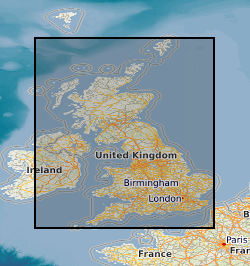G-BASE water samples
The BGS Geochemical Baseline Survey of the Environment (G-BASE) was the national strategic geochemical mapping programme in Great Britain. The project set out to establish the chemistry of the surface environment by the collection and analysis of stream sediment, stream water and soil samples. Beginning in the late 1960s in northern Scotland and moving southwards across the country, the primary focus was mineral exploration, however, the project quickly developed to address important environmental concerns. The final G-BASE samples were collected in southern England in 2014. The outputs from the G-BASE project provide an invaluable, systematic baseline of geochemical information for Great Britain, serving as a marker of the state of the environment against which to measure future change. Stream water samples were collected at each drainage site. Four different water samples were collected routinely: two filtered waters (for major and trace elements) and two unfiltered waters (for pH, conductivity and alkalinity). Samples were collected for approximately 85% of Great Britain, but a wide range of analytes were only determined from the Wales and Humber-Trent atlas areas southwards. Stream water pH, conductivity and alkalinity were determined in the field. In the later stages of the programme, stream water samples from high order streams were analysed by ICP-AES/MS for 27 elements (Al, B, Ba, Be, Ca, Cd, Co, Cr, Cu, Fe, K, La, Li, Mg, Mn, Mo, Na, Ni, P, Pb, S (as SO42-), Si, Sr, V, Y, Zn and Zr) and by quadrupole ICP-MS for 24 trace elements (Ag, Al, As, Ba, Be, Cd, Ce, Co, Cr, Cu, La, Li, Mo, Ni, Pb, Rb, Sb, Sn, Th, Tl, U, V, Y and Zr). Some samples were analysed by ion chromatography (IC). Automated colorimetric methods were used to determine Cl and NO3-, and an ion selective electrode (ISE) technique was used to determine F. Waters were also analysed for non-purgeable organic carbon (NPOC) to determine dissolved organic carbon content. All samples were routinely analysed for pH, conductivity and bicarbonate. Much of the UK coverage also includes uranium and fluoride analyses. For more information about accessing these samples and their analytical results, contact BGS Enquiries ([email protected]).

dataset
Geochemical baseline survey of the environment (G-BASE)
- The BGS Geochemical Baseline Survey of the Environment (G-BASE) is the national strategic geochemical mapping programme in Great Britain. The project set out to establish the chemistry of the surface environment by the collection and analysis of stream sediment, stream water and soil samples.
:
http://data.bgs.ac.uk/id/dataHolding/13605452
English
Geoscientific information
GEMET - INSPIRE themes, version 1.0:
BGS Thesaurus of Geosciences:
Stream sampling
Geochemical mapping
UK Location (INSPIRE)
Scottish SDI
Geochemical background
Geochemistry
Sample analysis
EGDI
Geochemical sampling
Sampling
Geology
Geochemical data
Streams
Free:
NERC_DDC
-8.6500,
49.8500,
1.7800,
60.8800
GBN, GREAT BRITAIN [id=139600]
creation: 2000
1968
-
2014
text table
British Geological Survey
Enquiries
The Lyell Centre, Research Avenue South,
EDINBURGH,
EH14 4AP,
United Kingdom
tel: 0115 936 3142
email:
[email protected]
Role: distributor
British Geological Survey
Enquiries
The Lyell Centre, Research Avenue South,
EDINBURGH,
EH14 4AP,
United Kingdom
tel: 0115 936 3142
email:
[email protected]
Role: point of contact
Data Quality
Sampling and data collection procedures evolved over the course of the G-BASE project. More information may be found in the G-BASE field procedures manual (2005): https://nora.nerc.ac.uk/id/eprint/5190/. The G-BASE project was initially called the 'Regional Geochemical Reconnaissance Programme' (RGRP) and subsequently the 'Geochemical Survey Project' (GSP). All G-BASE data have been loaded into the BGS Geochemistry Database.
INSPIRE Implementing rules laying down technical arrangements for the interoperability and harmonisation of Geology
Commission Regulation (EU) No 1089/2010 of 23 November 2010 implementing Directive 2007/2/EC of the European Parliament and of the Council as regards interoperability of spatial data sets and services
Constraints
The copyright of materials derived from the British Geological Survey's work is vested in the Natural Environment Research Council [NERC]. No part of this work may be reproduced or transmitted in any form or by any means, or stored in a retrieval system of any nature, without the prior permission of the copyright holder, via the BGS Intellectual Property Rights Manager. Use by customers of information provided by the BGS, is at the customer's own risk. In view of the disparate sources of information at BGS's disposal, including such material donated to BGS, that BGS accepts in good faith as being accurate, the Natural Environment Research Council (NERC) gives no warranty, expressed or implied, as to the quality or accuracy of the information supplied, or to the information's suitability for any use. NERC/BGS accepts no liability whatever in respect of loss, damage, injury or other occurence however caused.
Available under the Open Government Licence subject to the following acknowledgement accompanying the reproduced NERC materials "Contains NERC materials ©NERC [year]"
The dataset is made available to external clients under BGS Digital Data Licence terms and conditions. Revert to the IPR Section ([email protected]) if further advice is required with regard to permitted usage.
The dataset is made freely available for access, e.g. via the Internet. Either no third party data / information is contained in the dataset or BGS has secured written permission from the owner(s) of any third party data / information contained in the dataset to make the dataset freely accessible.
Metadata about metadata
9df8df53-2a86-37a8-e044-0003ba9b0d98
British Geological Survey
The Lyell Centre, Research Avenue South,
EDINBURGH,
EH14 4AP,
United Kingdom
tel: +44 131 667 1000
email:
[email protected]
Role: point of contact
2026-02-02

